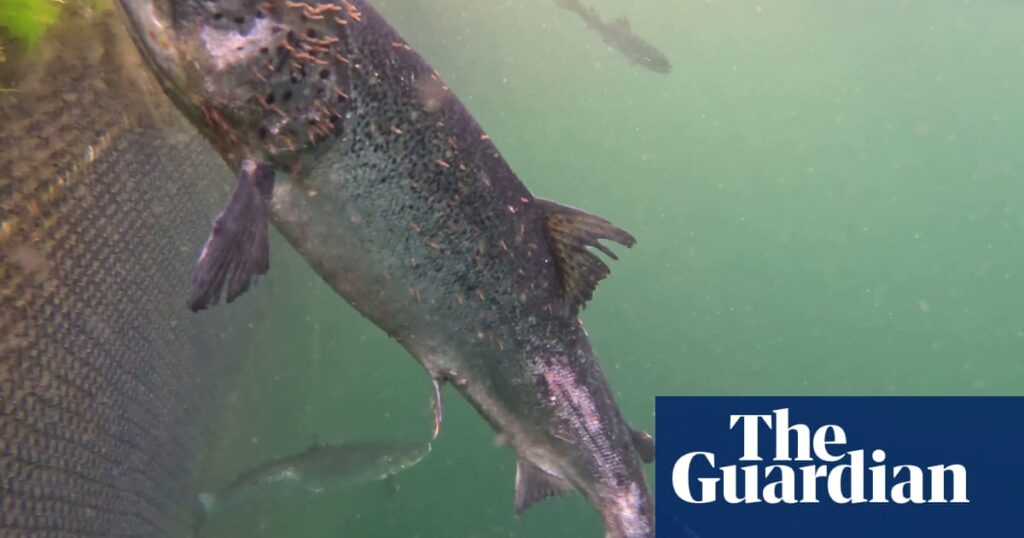Scottish salmon industry challenged over move to drop ‘farmed’ from labels | Animal welfare

Animal welfare campaigners are challenging the decision to allow producers of Scottish salmon to drop the word “farmed” from labelling.
An application by the industry body claimed changing the protected name wording on the front of packaging from “Scottish farmed salmon” to “Scottish salmon” made sense because wild salmon was no longer sold in supermarkets, which consumers were aware of.
But charities and chefs have criticised the decision by the Department for Environment, Food and Rural Affairs (Defra), taken last month, to allow Salmon Scotland’s application, saying it facilitates greenwashing and will mislead consumers.
Rachel Mulrenan, of WildFish, one of the organisations bringing the legal challenge, said: “As sustainability issues become increasingly important, this is a thinly disguised attempt by the Scottish salmon farming industry to pull the wool over consumers’ eyes, both in the UK and further afield.
“More than ever, people need to know the true origin of the products they are buying and consuming, so that they can make informed decisions. This name-change is a step in the wrong direction.”
The change relates to the labelling of salmon from Scotland under the protected geographical indication (PGI) scheme, which was brought in to replace a similar EU scheme. Other protected Scottish products include Scotch whisky, lamb and beef. The fact the salmon is farm-raised will still have to be displayed on the back of packaging.
At the time the application was granted, Salmon Scotland said: “When consumers talk about ‘Scottish salmon’, they are talking about farm-raised Atlantic salmon from Scotland – and this change makes that clear.”
Abigail Penny, the executive director of Animal Equality UK, the other organisation appealing to the first-tier tribunal, said: “Changing a label doesn’t change the reality. The Scottish farmed salmon industry is riddled with issues. Deadly lice infestations and disease outbreaks aren’t just common, they are the norm, and they are causing millions of salmon to die on farms each year. Rather than admit to its ineptitude, the industry is instead attempting to bury the truth, and risks seriously deceiving unsuspecting consumers in the process.”
Intensive salmon farming can also threaten wild salmon populations if escaped farmed fish breed with wild fish. More than 200 chefs and restaurants, as well as 60 community groups, charities and NGOs, are supporting WildFish’s “off the table” campaign, which asks chefs and restaurants to take farmed salmon off their menus.
Animal Equality UK and Wildfish claim that, as well as misleading consumers, the change to the PGI breaches assimilated EU Regulation 1151/2012 on quality schemes for agricultural products and foodstuffs.
Tim Maddams, the former head chef of the River Cottage Canteen, said: “Be it farmed salmon that are fed on wild-caught fish and reared in low-welfare lots that pollute these beautiful remote places, or the vast array of not-quite-commitments to welfare standards (‘outdoor bred, freedom food, outdoor reared’) of land-based agriculture, this decision is one more nail in the coffin for Scotland’s wild salmon and sea trout and another opportunity for profit from this disappointing industry.”
The naturalist and broadcaster Chris Packham, who is the president of the animal welfare charity the RSPCA, has described the growing Scottish salmon farming industry as “catastrophic” for fish welfare and Scotland’s environment.
Tavish Scott, the chief executive of Salmon Scotland, said: “We know when consumers talk about ‘Scottish salmon’ they are talking about the salmon produced by our member companies, and the update to the PGI is a small but important clarification.”
Defra declined to comment while proceedings were under way.
Source: theguardian.com

